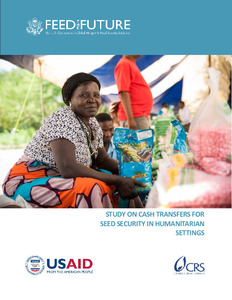Study on cash transfers for seed security in humanitarian settings
Abstract
This study examines the barriers and opportunities for cash transfers to be used to address seed security in humanitarian situations. Cash, while not a new approach, has gained momentum in recent years, especially with the emergence of the Cash Learning Partnership (CaLP) and humanitarian organizations’ commitments through the Grand Bargain.2 Historically, direct seed distribution (DSD) has dominated agricultural responses in emergencies. While effective in many situations, other modalities of addressing farmers’ needs have also proven to be effective, including seed and voucher fairs and, increasingly, cash transfer responses. The latter response typically provides farmers greater choices to make decisions about their seed needs and preferences. However, as with direct distribution and vouchers, cash can be a viable option but may not always be appropriate in every situation.
The quality of seed is of paramount importance in choosing a response and has been an ongoing (and often contentious and political) discussion for decades. The results of this study advocate for a multi- stakeholder perspective on the quality of seed, while offering farmers the most flexible and most appropriate response possible for their given situation. In some cases, this will be cash transfers, but certainly not in all cases. A range of options offers the best chance for a successful, responsive, and appropriate program.
The evidence base on outcomes from using cash for seed in humanitarian contexts is limited, however, reviewing a series of examples shows the breadth and range of options that are being explored. The cases from an array of organizations and countries including Iraq, Ethiopia, Nigeria, Uganda, Zambia, Zimbabwe, Malawi, Madagascar, and Guatemala, show that understanding the context is key to the response analysis and the choice of modality. Organizational approaches and previous experience also played a role in the choice of modality. The evidence to date shows that cash, in addition to complementary programming such as technical or business training, offers promise for seed security interventions. In addition, initiatives to support both the demand and supply side of the market have proven to be effective.
Key findings include:
1. Market and needs assessments must include a seed component or SSSA to ensure a response designed to address the right problem, not the assumption. For markets, both informal and formal seed markets need to be included.
2. Good needs assessments, response analysis and program design help ensure participants’ spending cash on what implementers anticipate they will.
3. Program participants’ preferences on modalities are not consistently included in response analysis.
4. Mixed modalities (cash and vouchers, or cash and DSD) can broaden crop choices.
5. Quality screenings for seed are taking place; the quality of seed is important to organizations and project participants.
6. Cash for seed security interventions are limited, but growing in prevalence.
7. Providing cash plus complementary support is a promising practice for fostering seed security.
8. The nexus between relief and development is critical—designing projects with a longer-term development view: cash can prepare the way for farmers to continue true market engagement post-relief, spur business development in subsequent seasons, and offer opportunities for financial inclusion.
9. Supporting supply side to bring quality seed markets ‘closer’ to project participants should be considered along with demand-side interventions (cash, voucher and other).
10. Investment in preparedness provides a better foundation to implement impactful cash for seed security response.
The risks, mitigating actions, opportunities and enablers for cash and seed security response are also explored. The study concludes with actionable and practical recommendations for further advancing the evidence base, as well as implementation suggestions. Continuous collaboration of key stakeholders in seed systems is essential to advance the discussions and action on the way forward with cash and seed systems.

